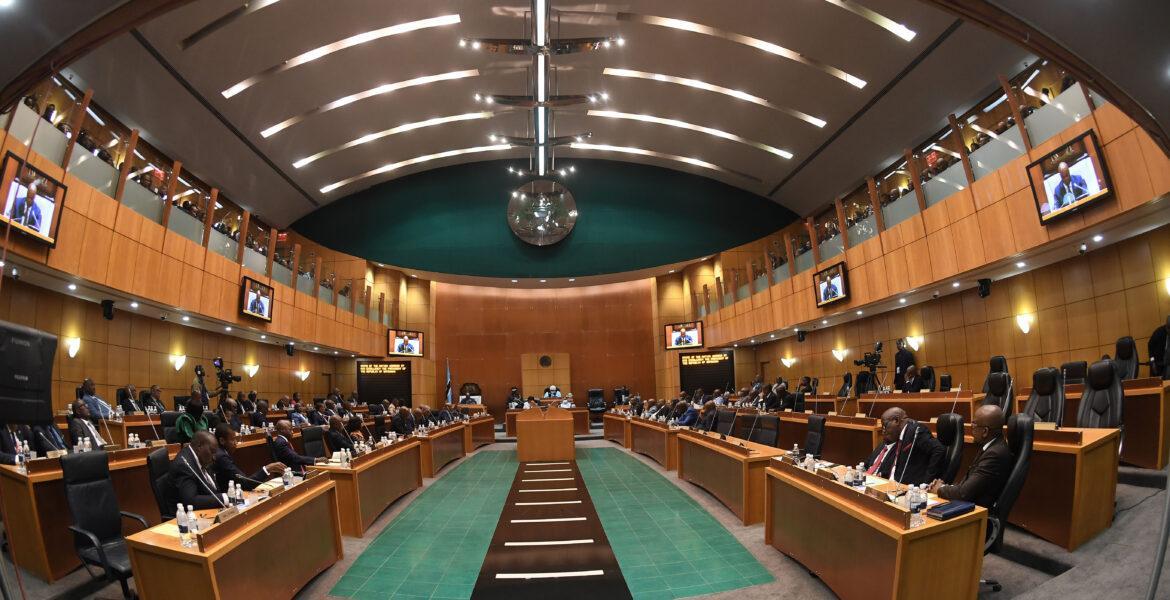Africa-Press – Botswana. Parliaments are the voice of the people and hold the sacred responsibility of championing policies and legislation to uplift the lives of all citizens, especially the most vulnerable.
Addressing the 150th Inter-Parliamentary Union (IPU) Assembly on Sunday at Tashkent, Uzbekistan, the Speaker of the Botswana National Assembly, Mr Dithapelo Keorapetse said they must be proactive in enacting laws that promoted the economic empowerment of citizens, creating an enabling environment for sustainable job creation, entrepreneurship, and skills development.
Mr Keorapetse said the move would include promoting access to finance, technology and markets for all citizens, regardless of their background.
“Within this equation, quality education and accessible healthcare are other key areas, which are fundamental human rights,” he said.
Mr Keorapetse said they must invest in building more schools and hospitals to ensure that every child had the opportunity to learn and that all children had access to basic medical care.
“We must also strengthen our social welfare programmes, to ensure that they are effective, efficient and reach those who need them the most,” he said.
Mr Keorapetse said Botswana has witnessed a historic democratic transition in which after nearly six decades of rule by one party, the people spoke unequivocally for change and power shifted peacefully to the Umbrella for Democratic Change (UDC) under the able leadership of President Advocate Duma Gideon Boko.
He said this process was not merely an election but a rebirth of the principles of accountability and a demand, through the ballot box, for a new order in which there was social development and justice.
“It signified the consolidation and maturity of our democracy as it was a sharp contrast from the trend of unconstitutional changes of government witnessed elsewhere on the African continent,” said Mr Keorapetse.
He said the country’s founding President, the late Sir Seretse Khama, once said, “Democracy, like a little plant, does not grow or develop on its own. It must be nursed and nurtured if it is to grow and flourish. It must be believed in and practiced if it is to be appreciated. And it must be fought for and defended if it is to survive.”
He said the new government had fought gallantly for democracy and therefore committed to nurture it through robust democratic reforms to ensure that, it was indeed a government of the people, by the people and most importantly for the many people and not just for the few.
Mr Keorapetse said 2024 elections also highlighted a sobering reality as Botswana’s Parliament had fewer women at only nine per cent.
In comparison to other Parliaments the world over, Mr Keorapetse said, these were very low and disappointing statistics.
Therefore, he said the situation called on the country to reflect and introspect on the IPU’s call for gender parity, which should not be viewed just as an idealistic reform; but also as a reminder about the urgency of electoral reforms that would help realise the important objective.
On a more positive note, Mr Keorapetse said about 36 per cent of the members of the 13th Parliament of Botswana were as per IPU standards, young Parliamentarians.
He also said members of the 13th Parliament of Botswana were an educated and diverse group, whose mandate was to be a model of excellence in democracy by providing transformative legislation that uplifted the marginalised groups of society and relentless oversight to curb corruption.
Also, the Speaker noted that the 13th Parliament would also provide robust capacity building to equip MPs as stewards of justice and promote parliamentary diplomacy to forge alliances to amplify the goals and objectives globally.
Mr Keorapetse said Botswana’s new administration had placed human rights at the centre of its activities and processes.
“This has seen a restructuring of our foreign policy, where we place human rights at the centre of our engagements with external actors and partners,” he said.
He said the human rights approach was not only a moral imperative, but also a reflection of Botswana’s commitment to democratic principles, justice and equality.
“Botswana thus strives to engage with other nations from a position of integrity and conviction. By adopting a human rights based approach, the government of Botswana supports causes promoting peace, stability and sustainable development both at home and abroad,” he said.
He said gender equality was not just a matter of fairness but an essential for social and economic progress.
“In this regard, we must enact laws and policies that promote equal opportunities for women and girls in all areas of life,” he said.
He said good governance and accountability were also key elements of social development and justice because transparency, accountability, and the rule of law, were essential for social development and justice.
“We must therefore strengthen our institutions, combat corruption and ensure that all citizens are not short-changed and have equal access to justice,” said Mr Keorapetse.
He said parliaments must also play a crucial oversight role to ensure that government policies and programmes were implemented effectively and efficiently.
“We must create a conducive environment for social development and justice through enacting and amending laws that promote social welfare and holding the government accountable for the implementation of these social programmes,” he said.
He said Botswana possessed a well-established social protection system relying on budgetary allocations approved by Parliament.
Mr Keorapetse reminded IPU its vital role in shaping and driving the social development and justice agenda.
The IPU was held under the theme, “Parliamentary Action for Social Development and Justice” from April 5 to 9.
For More News And Analysis About Botswana Follow Africa-Press






